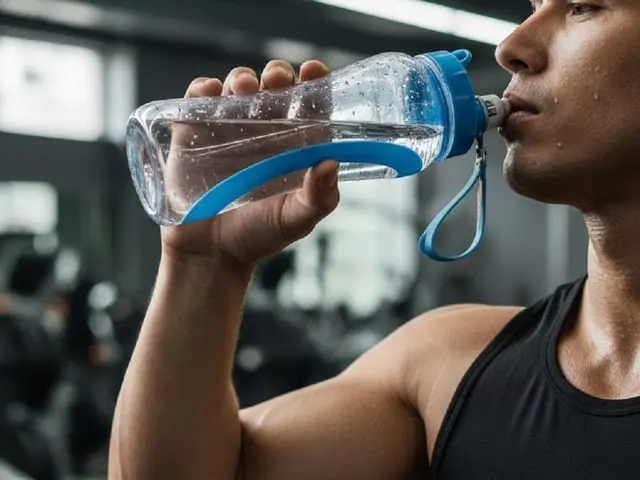Lack of water will lead to reduced plasma volume, increased heart rate, less effective muscle function and slower recovery speed. Many sports studies show that dehydration of only 1-2% of body weight is enough to reduce endurance, muscle performance and reflexes, according to the health website Healthline (USA).

Drinking too little water will reduce muscle performance and easily cause cramps. PHOTO: AI
Drinking little water can cause the following effects on gym goers:
Reduced blood flow to muscles
One of the immediate effects of dehydration is a decrease in plasma volume. Plasma helps transport nutrients and maintain blood volume. When you are dehydrated, your plasma volume decreases, and your heart must beat faster to compensate.
This causes blood to flow more slowly. As a result, muscles receive less oxygen and nutrients to maintain muscle contraction, leading to faster fatigue and reduced performance. This is why people who drink less water often feel tired quickly.
A study published in the Journal of the American College of Nutrition found that dehydration of 2% of body weight reduces plasma volume. As a result, the ability to perform endurance exercise is significantly reduced.
Thermoregulation disorders
When exercising, the body generates heat and sweat begins to be secreted to cool down. If there is a lack of water, this mechanism is impaired, causing an increase in body temperature. Increased body temperature causes muscles to tire quickly, lactic acid levels to increase early and the body cannot maintain high intensity exercise.
Effects on nerve and muscle conduction
Water is not only a solvent but also maintains electrolyte balance. When you drink too little water, the levels of sodium, potassium and calcium are disturbed, affecting the nerve signals sent to the muscles. This results in reduced strength, reflexes and the ability of muscle fibers to contract. People with this condition are also more prone to cramps.
Slow waste removal
During exercise, muscles produce many metabolites such as CO₂, H⁺ ions and lactic acid. To recover quickly, the body needs to remove them through the blood and deliver amino acids, glucose and oxygen to the muscles to repair the damage.
However, when there is a lack of water, the blood becomes thicker, causing slower circulation. Therefore, nutrients have difficulty reaching the muscles and slowing down the recovery process. Metabolic waste accumulates, leading to increased muscle soreness after exercise.
To maintain performance and aid muscle recovery, people should start their workouts well hydrated. The recommended amount of water to drink is about 5-7 ml/kg of body weight at least 2 hours before exercise. For example, a 60 kg person should drink at least about 300-420 ml. Continue to drink enough water during and after exercise, according to Healthline.
